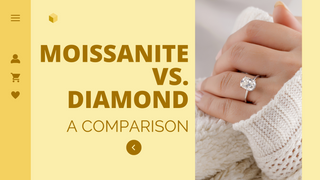Table of Contents
- Introduction
- Understanding Moissanite and Diamond
- The 4 C's Comparison
- Durability and Hardness
- Sparkle and Brilliance
- Ethical and Environmental Considerations
- Cost Comparison
- Longevity and Maintenance
- Choosing the Right Stone for You
- Frequently Asked Questions
- Conclusion
Introduction
When it comes to choosing the perfect gemstone for an engagement ring or any other piece of jewelry, the decision often boils down to moissanite and diamond. These two sparkling stones share similarities, but they also have distinct differences that are worth exploring. In this article, we'll delve into the world of moissanite and diamond, comparing their characteristics, values, and overall appeal.
Understanding Moissanite and Diamond
What is Moissanite?
Moissanite is a lab-created gemstone that possesses remarkable brilliance and fire. Composed of silicon carbide, it was first discovered in a meteor crater by Dr. Henri Moissan, from whom it gets its name. Due to its unique optical properties, moissanite exhibits a dazzling play of light, often outshining even diamonds in certain lighting conditions.
What is Diamond?
Diamonds are naturally occurring gemstones formed deep within the Earth's crust under immense pressure and heat. Renowned for their unparalleled durability and sparkle, diamonds have been cherished for centuries as symbols of love and luxury.
The 4 C's Comparison

2.1 Carat Weight
When comparing carat weight, both moissanite and diamonds are measured in the same way. However, moissanite is less dense than diamonds, so a one-carat moissanite stone will appear slightly larger than a one-carat diamond.
2.2 Color Grading
Diamonds are graded on their color, with the most valuable diamonds being colorless. On the other hand, moissanite naturally emits colorful flashes of light, and its color grade is usually near colorless.
2.3 Clarity Levels
Diamonds and moissanite have different clarity characteristics. Diamonds can have internal flaws known as inclusions, while moissanite is nearly inclusion-free due to its lab-grown nature.
2.4 Cut and Brilliance
Both stones can be cut in various shapes and styles. Moissanite's exceptional fire and brilliance are a result of its high refractive index, while diamonds' brilliance comes from their ability to refract light.
Durability and Hardness
Moissanite's Resilience
Moissanite ranks high on the Mohs scale of hardness, making it a durable option for daily wear. Its toughness makes it resistant to scratches and chips.
Diamond's Sturdiness
Diamonds are the hardest known substance, earning a perfect 10 on the Mohs scale. Their remarkable hardness ensures they can withstand the rigors of everyday life without losing their luster.
Sparkle and Brilliance
Moissanite's Unique Fire
Moissanite's fiery display of multicolored light is captivating and unique. Its play of color, known as "fire," is more pronounced than that of diamonds.
Diamond's Classic Brilliance
Diamonds are celebrated for their classic white light brilliance. Their exceptional ability to reflect and refract light creates a timeless sparkle that has been coveted for generations.
Ethical and Environmental Considerations
Moissanite's Ethical Origins
Moissanite is ethically sourced, being created in laboratories. Its production has a lower impact on the environment compared to diamond mining.
Diamond's Conflict-Free Alternatives
Diamonds come with ethical concerns related to conflict diamonds. However, the industry has made strides in offering conflict-free and ethically sourced diamonds.
Cost Comparison
Investing in Moissanite
Moissanite offers an affordable alternative without sacrificing beauty. Its attractive price point allows for larger stones and intricate designs.
The Prestige of Diamonds
Diamonds carry a higher price tag due to their rarity and cultural significance. They are often seen as a symbol of status and tradition.
Longevity and Maintenance
Moissanite's Endurance
Moissanite's hardness ensures its durability over time. Regular cleaning and maintenance will keep it looking stunning for years.
Diamond's Timeless Resilience
Diamonds' exceptional hardness and resilience mean they can be passed down as heirlooms, maintaining their brilliance for generations.
Choosing the Right Stone for You
When choosing between moissanite and diamond, consider your budget, values, and personal preferences. Both stones offer exceptional beauty and lasting sparkle, so the decision ultimately depends on what aligns best with your needs.
Read Why Choose Moissanite Rings for Your Perfect Engagement?Frequently Asked Questions
9.1 Are moissanite engagement rings a good choice for daily wear?
Moissanite's hardness makes it suitable for daily wear, and its brilliance remains consistent even with regular use.
9.2 Can a moissanite visually pass as a diamond?
Yes, moissanite's exceptional sparkle often makes it indistinguishable from a diamond to the naked eye.
9.3 How do I determine the right stone for my budget?
Consider your budget's flexibility and what aspects matter most to you, whether it's size, sparkle, or ethical considerations.
9.4 Is a moissanite or diamond better for an engagement ring?
Both stones are excellent choices. Moissanite offers affordability and beauty, while diamonds carry tradition and prestige.
9.5 What are some unique ring designs that highlight these stones?
For moissanite, intricate vintage designs can accentuate its brilliance. Diamonds shine in classic solitaires and halo settings.
Conclusion
In the debate of moissanite vs. diamond, there's no one-size-fits-all answer. Both stones possess their own unique qualities that cater to different preferences and values. Moissanite dazzles with its fiery display of colors, making it an excellent choice for those who seek a distinctive and budget-friendly option. On the other hand, diamonds stand as timeless symbols of tradition and prestige, captivating with their classic brilliance.
Ultimately, the choice between moissanite and diamond depends on your personal priorities. Whether you're drawn to the captivating fire of moissanite or the enduring allure of diamonds, both stones have their own merits and can serve as beautiful symbols of love and commitment.
As you embark on this exciting journey of selecting the perfect gemstone, consider your budget, style, and values. Whether you choose the modern allure of moissanite or the enduring charm of diamonds, your choice will undoubtedly reflect the uniqueness of your love story.
Remember, it's not just about the stone you choose, but the sentiment and emotions you pour into the piece that truly make it priceless.

